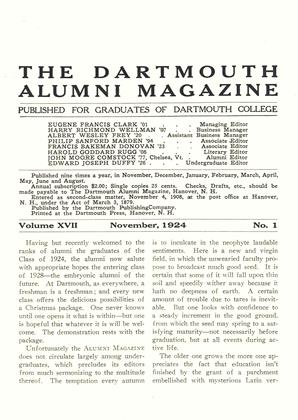By OZORA S. DAVIS '89. University of Chicago Press. Pp. XVII, 270.
This is a new volume in the series of Handbooks of Ethics and Religion, published by the University of Chicago Press. Dr. Davis, who is president and professor of Homiletics at Chicago Theological Seminary, (Congregational) has already put the preachers of the country under obligation to him by the publication of Preaching the Social Gospel, and Preaching by Laymen. The present volume is more technical and somewhat different in scope and plan from the other works.
In this text, the author has applied the "case" or laboratory method to the important study of sermon building. A brief space is devoted to instructions for study, and part one is given over to eight typical "sermons of power" by English and American pulpit masters. The range of material is wide, and each example is one in which the homiletical method is plain. These are designed for inductive study. Each is furnished with brief biographical material; and a plan of study follows, aimed to stimulate thought in the student and to lead him to further conclusions than set forth by the author.
In part two, "Principles of ..Preaching," twelve brief chapters discuss such topics as "The Sermon," "The Text" "Illustrations," "Unity," "Style," etc. These, too, seek rather to lead the student to further investigation and discovery, than to be either final or formal. The entire work breathes the spirit of the newer age in a department of thought that is sometimes considered static and traditionbound, rather than progressive.
While Dr. Davis's book is primarily a text book for theological students, working under guidance in the seminary, it is so clear, fresh, and suggestive that it will be found profitable to other groups. Several denominations, including Dr. Davis's own, the Congregational, are asking their ministeral recruits, whose educational advantages have been in some ways limited, to carry on with further study under direction, as a preliminary to ordination. For such men this volume will be found exceedingly useful. It hardly need be said it is not a book for the general reader.
 View Full Issue
View Full Issue
More From This Issue
-
 Article
ArticleSOME ATTRIBUTES OF UNDERGRADUATE EDUCATION
November 1924 By President Ernest Martin Hopkins -
 Article
ArticleTHE ALUMNI FUND
November 1924 By Clarence G. McDavitt 1900 -
 Article
ArticleHaving but recently welcomed to the ranks
November 1924 -
 Sports
SportsATHLETICS
November 1924 -
 Article
ArticleFROM THE UNDERGRADUATE CHAIR
November 1924 -
 Article
ArticleTHE CLASS OF 1928
November 1924 By E. Gordon Bill
Books
-
 Books
BooksPRIVATE.
DECEMBER 1970 By HENRY B. WILLIAMS -
 Books
BooksFreedom's Mirage
May 1980 By Nelson Kasfir -
 Books
BooksSPEARHEADS FOR REFORM, THE SOCIAL SETTLEMENTS AND THE PROGRESSIVE MOVEMENT 1890-1914.
JANUARY 1968 By PHILIP S. BENJAMIN -
 Books
BooksDISCOVERY: THE AUTOBIOGRAPHY OF VILHJALMUR STEFANSSON.
OCTOBER 1964 By RICHARD W. MORIN '24 -
 Books
BooksTANSTAAFL: THE ECONOMIC STRATEGY FOR ENVIRONMENTAL CRISIS.
JULY 1971 By THOMAS B. ROOS -
 Books
BooksTHE WAY OF LIFE OF WU MING FU,
January 1943 By Wing-Tsit Chan


